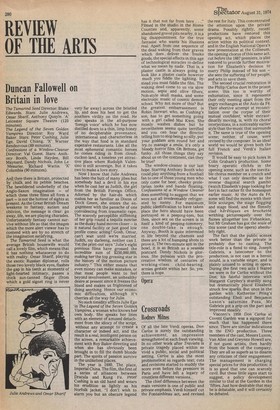Opera'
Crossroads
Rodney Milnes
Of all the late Verdi operas, Don Carlos is surely the outstanding achievement, an impression strengthened at each fresh viewing. In no other work after Traviata is private tragedy placed within so vivid a public, social and political setting. Carlos is also the most problematical as regards text; cuts and revisions started to muddy the score even before the premiere in Paris and have left a legacy of countless different versions. _ The chief difference between the main versions is one of public and private emphasis. Verdi himself cut the Fontainbleau act, and revised. the rest for Italy. This concentrated the attention upon the private drama. Possibly rightly, recent productions have restored this opening act, which places the action within its political context, and in the English National Opera's new presentation at the Coliseum, the opening chorus of this same act, cut before the 1867 premiere, is also restored to provide further motive-. tion for Elisabeth's decision to marry Philip instead of his son — she sees the suffering of her people, and acts to save them.
The second crucial restoration is the Philip/Carlos duet in the prison scene; this too is worthy of exhumation, since it represents their only meeting apart from the angry exchanges at the Auto da Fe. Their abortive attempt at reconciliation over the corpse of their mutual confidant, while extraordinarily moving, is, with its choral interjections, in a noticeably earlier style than the music that surrounds it. The same is true of the opening scene; neither, of couse, were revised by the composer. In an ideal world we would be given both the full French and Verdi's Italian revision.
Tt-WouId he easy to pick holes in Colin Graham's production. Some hoary operatic clichés in the opening scene, such as the inevitable chorus member on a crutch and what I can only describe as the reverse diagonal search gambit (watch Elisabeth's page looking for her) in fact rather fit the homespun earlier music. At the Auto da Fe, some will find the monks with their little scoUrges, the stage flogging and stage blood, and the flimsily clad heretiques en brochette writhing picturesquely over the flames altogether too Firbankian, but Mr Graham has got the scale of this scene (and the opera) absolutely right.
The fact that the public scenes work better than the private is probably due to casting. The title-role is a fiend to sing. Joseph Gabriels, a latecomer to the production, is not cast in a heroic mould, is a variable singer, and is plainly unused to acting in opera. During the first two acts I feared we were in for Carlos without the Don; his fateful interview with Margaret Curphey's sturdily sung but dramatically placid Elisabeth struck few sparks. But once in the garden with Katherine Pring's outstanding Eboli and Benjamin Luxon's saturnine Pose., Mr Gabriels got a grip on the part and improved steadily.
Visconti's 1958 Don -Carlos. at Covent Garden was a signpost for much that has happened there since. There are similar indications in the ENO production. Three members of the cast, Messrs Luxon, Van Allen and Gwynne Howell are, if not guest artists, then hardly from the bosom of the company. They are all so superb as to disarm any criticism of their engagement. The management is charging special prices for this production; it is so good that one can scarcely cavil. But these little signs start to suggest, a policy development similar to that at the Garden in the 'fifties. Just how desirable that may be is debatable, and it will certainly
be debated. •


































 Previous page
Previous page